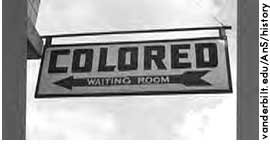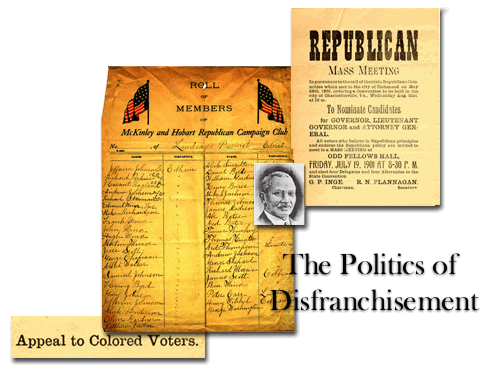1930s in the South and To Kill A Mockingbird
Jim Crow Laws

Amendments to the Constitution gave African Americans freedom and voting rights, but state legislatures in the South made laws to try to limit those rights. The Supreme Court ruled that the separate but equal facilities of the segregated South were legal. Jim Crow laws forced African-Americans back into second-class status, but World War II and Brown v. Board of Education began to desegregate the South. The National Guard had to forcibly integrate schools in response to Southern violence. New federal laws provided additional protection for voting, fair housing, and civil rights.
Topic: Jim Crow laws Language: English Lexile: 1470 http://www.gwu.edu
Harper Lee (b. 1926)
Harper Lee and her friend Truman Capote each experienced success, but lived their lives in completely different ways. This biography of Harper Lee tells you about the life and career of the author of To Kill a Mockingbird, and examines the complicated friendship between Harper Lee and Truman Capote that included both ups and downs. It also discusses how the novel came to be written and the reception it received from the public. Information on honors and awards concludes the article along with a quote from Lee herself.
Topic: Lee, Harper Language: English Lexile: 1110 Biography http://www.neabigread.org
Behind the Veil: Documenting African American Life in the Jim Crow South
Six people share their experiences in Georgia during the Jim Crow era in these oral history interviews. Edward Gamble's granddaddy was a preacher and owned farmland, but others were sharecroppers. James Hall tells about people who wanted to kill his daddy and claimed he owed them money, so they had to move. Curtis Leroy Williams tells about his segregated school and writing an editorial for the school paper requesting a gym like the white school. Jurl Portee Watkins tells of walking five miles each way to school because there were no buses.
Topic: Jim Crow laws, Oral history Language: English Lexile: 1160 Audio Primary Source Material
http://library.duke.edu
The Thirties


Jim Crow etiquette operated in conjunction with Jim Crow laws (black codes). When most people think of Jim Crow they think of laws (not the Jim Crow etiquette) which excluded blacks from public transport and facilities, juries, jobs, and neighborhoods. The passage of the 13th, 14th, and 15th Amendments to the Constitution had granted blacks the same legal protections as whites. However, after 1877, and the election of Republican Rutherford B. Hayes, southern and border states began restricting the liberties of blacks. Unfortunately for blacks, the Supreme Court helped undermine the Constitutional protections of blacks with the infamous Plessy v. Ferguson (1896) case, which legitimized Jim Crow laws and the Jim Crow way of life.
http://www.ferris.edu/jimcrow/
 Encyclopedia Britannica
Encyclopedia Britannica
Contextual content on significant people, events and topics in US History.
The Great Depression and the New Deal
Depression: The WPA
Jim Crow Laws
From the 1880s to the 1960s, many Southern states passed Jim Crow laws to maintain a segregated society. As traditional racial barriers broke down during Reconstruction, these statutes were aimed at keeping the races separate. Jim Crow was from a black-faced minstrel show.

Harper’s Weekly illustration showing an African-American family threatened by a Ku Klux Klan member aiming a rifle in a doorway; 1872
Courtesy of the Library of Congress
The laws were intended to be discriminatory and perpetuate prejudice. They were not intended to be systematic but to address perceived problems like intermarriage and cohabitation. Social conventions segregated the races even when laws did not. Even stores and drinking fountains were segregated.
Topic: Jim Crow laws Language: English Lexile: 1370 Encyclopedia: http://www.encyclopediaofarkansas.net
The Civil Rights Movement
Although the Emancipation Proclamation freed the slaves back in 1865, the Jim Crow laws caused a century of continued social and economic bondage for African Americans. Those fighting to get out from under racism’s destructive power were relentless and innovative in their tactics. The United States held itself up as a beacon in a totalitarian world, but most African Americans had yet to benefit from those freedoms. In the mid 1900s, Black struggles for freedom were denounced as un-American. Learn about the Civil Rights Movement of the 50s and 60s, and view the slideshow of key people and events.
Topic: Civil rights movements, 20th century, Jim Crow laws Language: English Lexile: 1390 Image collection http://exhibitions.nypl.org
Jim Crow and the Ku Klux Klan
White Southerners resisted Reconstruction through Jim Crow laws and underground resistance groups like the Ku Klux Klan. White robes protected their identities as they engaged in intimidation and violence against African Americans and any whites who supported black rights. Their goal was white supremacy, but their methods eventually alarmed Southern white communities. After they lost public support, they disbanded. The Jim Crow laws remained, and some were even supported by the Supreme Court. Explore newspaper articles, editorial cartoons, and Klan advertisements from the late 19th and early 20th century.
Topic: Ku Klux Klan (KKK), Jim Crow laws Lexile:1110 Primary Source Material http://www.lva.virginia.gov
Jim Crow Laws

In Birmingham in 1930, it was illegal for a black and a white person to play cards or checkers together. In Nebraska in 1911, it was illegal for a white person to marry someone who was at least one-eighth African or Chinese. In Missouri in 1929, it was illegal for black children to attend white schools or for white children to attend black schools. African-Americans had separate waiting rooms, train cars, neighborhoods, and swimming pools.
Topic: Jim Crow laws Lexile: 1450 Image collection Primary Source Material: http://americanhistory.si.edu
More Songs from the 1930s
The Politics of Disfranchisement
Political events and movements in Virginia involving the suffrage of African Americans from 1900 to 1925 are described on this site. Discover why African Americans had to fight for the right to vote even after law granted it to them. Understand the meaning of disfranchisement. This site offers a timeline of political developments in Virginia, and profiles of African Americans involved in politics. Transcripts of suffrage legislation are available to study, as well as newspaper articles relating to African Americans and political activity.
Topic: African Americans--Suffrage (Right to vote) Lexile: 1280 http://www.vcdh.virginia.edu
- EResources
- Ebooks
- Contests and Opportunities
- Faculty Resources
- Library Good Reads
- GradPoint (opens in new window)
- LibGuides
- NHS Library Seminars (opens in new window)
-
Historical Links
- Immigrant Groups in the West
- Immigrant Groups in the West Making the Connections
- Immigration Symbols
- Immigration West
- Industrial Revolution Resources List
- Industrialists
- Korean War
- Legacy of Jim Crow
- The 60's
- Women and the Industrial Revolution
- Working Women and the Industrial Revolution
- Working Women During the Industrial Revolution
- Against Slavery
- Immigration
- Louis Braille An Exceptional Man
- MLA and APA Style Guides
- Norwood High School Home
- Quick reference
- Research & Instruction
- Summer Work
- Textbooks
This site provides information using PDF, visit this link to download the Adobe Acrobat Reader DC software.



